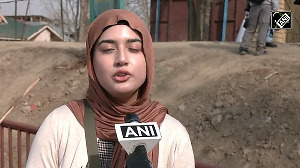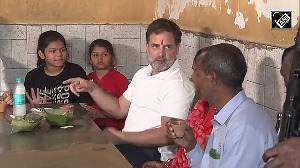The United Progressive Alliance government on Thursday declared that it will pursue a policy of 'zero-tolerance' towards terrorism from whatever source it originates and seek to reshape its relationship with Pakistan, which should confront terror groups inimical to India.
Outlining ten broad areas of priority for the next five years, President Pratibha Patil, in her address to the joint session of Parliament, said that internal security and preservation of communal harmony and stepping up of economic growth and agriculture, manufacturing and services would be among those.
In the address, which is mandatory after the general elections, she said the government had in 2004 set before the country a vision of an inclusive society and an economy and worked for it.
"My government sees the overwhelming mandate it has received as a vindication of the policy architecture of inclusion that it put in place. It is a mandate for inclusive growth, equitable development and a secular and plural India. My government is determined to work harder and better to realise these goals," she said.
Other priority areas would be concerted action for disadvantaged sections including women, Scheduled Castes, Scheduled Tribes and Other Backward Castes, governance reforms, creation and modernisation of infrastructure and capacity addition in key sectors, prudent fiscal management, energy security and environment protection and promotion of a culture of enterprise and innovations.
Maintaining that the government will keep utmost vigil in the area of internal security, the President said a policy of zero-tolerance towards terrorism from whatever source it emanates, will be pursued.
"Stern measures to handle insurgency and Left wing extremism will be taken. The government has already prepared a detailed plan to address internal security challenges to be implemented in a time-bound manner," she said.
Among other things, Patil said a Multi-Agency Centre will be strengthened to ensure effective intelligence sharing, complete operationalisation of National Investigation Agency to handle terror-related offences and expansion of the central and state police forces and intelligence agencies, besides equipping them with the best technology.
"A national counter-terrorism centre will be established to take pro-active anti-terrorism measures. Special Forces and Quick Response Teams will be raised and deployed in vulnerable areas," she said.
Patil also promised that the government would continue to 'constructively engage' with all groups that abjure violence in Northeast, Jammu and Kashmir and other parts of the country. She said her government would seek to re-shape its relationship with Pakistan depending on the sincerity of its actions to confront groups which launch terrorist attacks against India from its territory.
The President said communal harmony shall be preserved at all costs. "The mandate my government received was unmistakable in that the people wanted the country's secular fabric to be protected. With this objective, my government will seek early approval of the bill introduced in Parliament for the prevention of communal violence."
On economy, the government said the current financial year is expected to see a slowing down of growth on account of global recession. Recalling the three stimulus packages to counter the effects of global recession, Patil said, "Our immediate priority must n to focus on management of the economy that will counter the effect of global slowdown by a combination of sectoral and macro-level policies."
This, she said, must be accompanied by measures to achieve a counter-cyclical expansion in public investment in infrastructure sectors. With the government no longer dependent on the Left parties, she also unveiled plans for reforms for the financial sector.
The President said high-growth was necessary to provide the government the capacity to expand opportunities for employment and to provide resources to increase outlays in education, health care and infrastructure to meet the needs of all regions and people.
Implementing a Congress election promise, the President said the government would formulate the national Food Security Act, under which every family below poverty line would get 25 kg of rice or wheat per month at Rs 3 a kg.
The President's address said the three flagship programmes of the government the rural employment guarantee scheme, the rural health mission and the sarba siksha abhiyan - would be continued further.
On the foreign policy front, Patil said, "The transformation of our partnership with the United States of America will be taken forward. Our strategic partnerships with Russia has grown over the years and we will seek to further consolidate it."
She said the government will continue the sustained diplomatic efforts which have produced the qualitative changes in the relations since 2004. The multifaceted partnership with China will be expanded.
On Sri Lanka, Patil said India would support an initiative which can lead to a permanent political solutions of the conflict there and ensure that all Sri Lankan communities, especially Tamils feel, secure and enjoy equal rights so that they can lead a life of dignity and self respect.
Hailing the election of Meira Kumar as the first woman Speaker of the Lok Sabha, the President said the government would initiate, in the next 100 days, the early passage of the women's reservation bill in Parliament, providing for one third reservation in Parliament and state legislature and constitutional amendment to provide 50 per cent reservation for women in panchayats and urban local bodies.
It would also take concerted effort to increase the representation of women in central government jobs and initiate a national mission on the empowerment of women for implementation of women centric programmes.
The President also promised steps to enable the armed forces with modern technology to repel any threats from land, sea or air.






 © 2025
© 2025